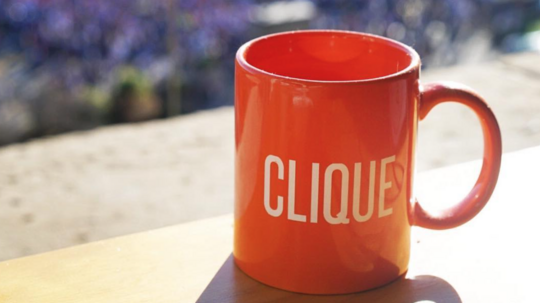
The founders at Clique Studios, a Chicago-based web design and development firm, were curious as to how their employees were feeling about their jobs on a day-to-day basis. They knew that maintaining a positive company culture improved recruitment and retention initiatives, which sparked an idea to build their own in-house engagement tool: HappyMeter.
The tool, which is like “Google analytics for culture,” prompts employees to answer a couple questions about their mood and outlook each day. The questions, written by the company’s leaders and managers, help them gauge how positive or negative employees are feeling about their work life.
Clique Studios was founded in 2009 by Derek Nelson, Ted Novak and John Gile. Now they have about 35 employees in their South Loop offices and recently launched a small, remote office in Denver. In 2016, Clique Studios began testing HappyMeter on their own employees, and then launched it publicly this year.

Now any company that’s also interested in monitoring their employees’ moods and thoughts can subscribe to the service for a two-week free trial. After that, it’s $5 per month per user.
“We wanted to give everybody an avenue to let us know how they’re feeling, but then also to raise ideas, give feedback or ask questions they might have,” Nelson said. “We built this platform to solve that internal need. But after a couple months of using it, we realized we were addicted to it. So, we decided to roll it out to some of our partners.”
The tool is customizable, so managers can change the question(s) and the frequency at which they are asked. Users can also respond to questions anonymously, if their answer is particularly sensitive.
At Clique, employees aren’t required to use the engagement tool. Some use it every day, while others opt to use it once a week, Nelson said.
Additionally, the tool is fairly transparent. Not only can managers see survey results, but all employees can see aggregated data on how the office is feeling in general. They won’t see individual responses from their coworkers, but they can get an idea of what the mood in the office that day is overall.
“If it’s an especially great day or if it’s a rough day, everybody deserves to know, have that information and act upon it as they see fit,” Nelson said. “Ultimately, it’s an analytics tool that should enable action.”
In a 2016 study by researchers at Harvard University, data showed that when employees felt heard, they were more likely to remain at that job longer and be more productive workers. That’s one of the goals Clique is trying to accomplish by using Happy Meter, Nelson said, adding that he’s heard retention and engagement has improved at other companies that use the tool.
Nelson said employees at Clique use HappyMeter to air grievances about a range of things, whether it’s venting frustrations about unrealistic deadlines or simpler things, like informing management that the temperature in the office is uncomfortably cold.
So far, about 100 companies subscribe to HappyMeter, said Brent Williams, the product manager for HappyMeter and the director of education at Clique Studios. Looking ahead, the company’s main focus is to improve the tool and add additional features.
“Our focus is to do a good job with the users we have and to learn as much from people that are getting value from it,” Williams said.









